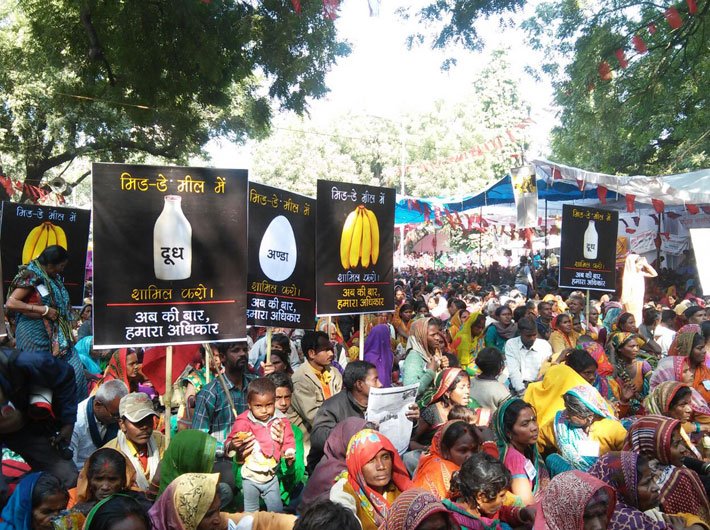Civil society campaigners come out on the streets to oppose Modi government policies
Thousands of farmers, pensioners, anganwadi workers and MNREGA beneficiaries held a mass rally and public meeting in Delhi on Tuesday to protest the NDA government's proposed changes in legal entitlements to labour rights, employment under MNREGA, healthcare and pensions.
The protest, at Jantar Mantar, was led by activists including Medha Patkar, Aruna Roy, Harsh Mander and Kavita Krishnan. They came on the same platform, with the rallying slogan of ‘Abki Baar, Humara Adhikar (this time, our rights)’. Political leaders such as D Raja of CPI, Mani Shankar Aiyar of the Congress and Prashant Bhushan of the AAP also extended solidarity.
Terming the proposed cuts as inhuman and preposterous, the protesters said any such reduction in funds for social sector programmes would hit the poor and vulnerable population most, given their dependence on public provisioning of essential services.
Protestors contended that the National Food Security Act has not taken off till date, with the deadline being postponed twice – now to April 2015. Also, in the government’s attempt for proper outreach of education, protestors raised serious concern over closure of almost 1 lakh government schools across the country. They also flagged the approximate 6 lakh vacant seats pertaining to the EWS category in private schools.
Protestors also demanded the need for universal pensions for all aged, single women, disabled and simple procedures to avail them. They called for resisting any attempts made by the government to target or restrict MNREGA. Protestors alleged that BJP, in its election manifesto, had promised to provide free medicines to people but now the government led by it was changing its stance by calling for providing only 50 medicines free of cost, that too only at the primary health centres. There have been reports on possible cuts in the union budget allocations for the current fiscal 2014-15 in social sector programmes, i.e., reductions in allocations in the revised estimates (RE) for 2014-15 as compared to the budget estimates (BE) that were made in July this year.
Research studies by the Centre for Budget and Governance Accountability (CBGA) have indicated that the levels of fund utilisation and the quality of expenditure in the social sector programmes can be improved significantly by addressing problems such as poor quality of decentralised planning in schemes, delays in fund flow from the centre, and inadequate institutional capacity due to shortage of human resources in social sectors. Protesters said the union government needs to initiate policy measures to address these systemic problems instead of cutting down fund allocations for social sector schemes.
Talking about the joint campaign to reclaim and reassert the rights of people, social activist Aruna Roy said that “given the numerous ways in which the rights of the most marginal people being attacked, rolled back, diluted and in many ways trivialised without due process of consultation, we are all here to first and foremost demand the right to be heard, engaged with and conferred on any policy decision that impact lives of ordinary people.”
Speaking about the many ways in which the new government had revealed “its intent to undermine people’s rights and entitlements”, Nikhil Dey asked “why there has been no appointment of information commissioners in many states”. “Clearly this inaction cannot be explained or justified as part of the economy measure of the new government,” he said.
Gulabi Behn Nayak, a 45-year-old campaigner from Dahod district of Gujarat, and her colleagues had pooled together funds to attend this event in the capital, and press the demand to raise the amount of old-age and widow pensions. She said it would be only through such protests that the government would be forced to listen to their demands. “We were promised that the problem of irregular and delayed pensions will be looked into. But nothing has changed yet. The old-age pension of Rs 400 and widow pension of Rs 750 is too less. It should be increased. For accessing these pensions people have to pay bribes,” she said.
“(Prime minister) Narendra Modi had promised to work for the poor, but the truth is different. Good days have come only for the corporate tycoons while the rights of the poor have been snatched away,” said Kavita Krishnan.
Economist Jean Dreze earlier led a rally where thousands marched with placards, demanding their basic rights and demands of work, ration, pension and maternity benefits.
The participating organisations included the All India Agricultural Labourers' Association, National Campaign on Dalit Human Rights, All India Democratic Women's Association, All India Progressive Women Association, Chhattisgarh Kisan Majdoor Andolan, Ekta Parishad, Greenpeace, Pension Parishad, Jamia Teachers' Solidarity Campaign, Jan Swasth Abhiyan, Pension Parishad, and Right To Food Campaign.

